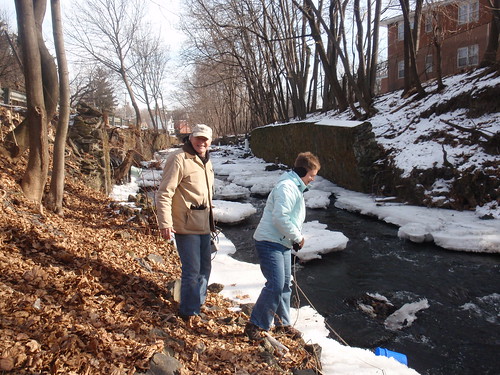Interview with Jack Carlson, CWA member
July 9, 2010 by admin
Jack Carlson has lived on New Hackensack Rd since 1999. Although his property is slightly outside the Casperkill watershed boundary, Mr. Carlson is a committed member of the Casperkill Watershed Alliance.
Nadine Souto: How did you become involved in the Casperkill Watershed Alliance?
Jack Carlson: I read an article in the Poughkeepsie Journal where they were offering a three-day course at SUNY New Paltz to be able to test the water quality in your area. And I thought that was a good thing because as a former chemistry teacher I know that water is the universal solvent so it would be nice to know what’s going on with the water in your area. So I took the course and at the end of it there were a whole lot of people that were looking to grab us for different watershed groups from all over the area. And I hooked up with one lady whose name I can’t remember, and I said I was from Poughkeepsie so she gave me a number to call and that’s how I hooked up with the Casperkill Watershed Alliance. I’m actually just a little bit out of the watershed area, by like a block. And the group’s first meeting was at Vassar, which is right in my backyard.
I guess I’m just sort of an ‘interested public’. That’s my role; I’m just an interested party.
Liz Jones: How long have you been involved?
JC: This summer will be a year.
NS: What is your interaction with the Casperkill Creek itself?
JC: We planted trees in various parts of the Casperkill that were showing a lot of erosion. We actually went down to the creek and planted all these trees and shrubs. We made the holes and put them in there to help secure the creek in these critical areas. We did that in two different locations through the Trees for Tribs program. I also did water testing with people at Vassar. That was so cool, I really loved that.
LJ: What values do you see in the stream? Why do you think it’s important to preserve?
JC: Well, if you haven’t studied the water cycle, water always comes back. So if one area is polluted, chances are that other areas within the same watershed will be polluted, too. Especially people who use well water are going to get affected because they’re going to be drinking that water. A healthy ecosystem depends on a healthy watershed, so I guess that’s why I’m really interested in it. My values are to better the environment by thinking globally but acting locally. I’m not coining that phrase but that’s what I’m doing. I want a clean environment for my children. And if I take time out of my life to clean up the environment maybe (my children) will think that it’s important for them to do that, too.
LJ: Do you have a vision for the future of the CWA?
JC: I would like to see the membership expand. I would like to see more hands-on activities, like the plantings and other practical things to protect the watershed.
NS: What do you think are the most important problems that should be addressed?
JC: In one word, pollution. And to add to that, public ignorance of the importance of watersheds in the ecosystem. I think those are the most important.
For more information about watershed citizen groups in the area, visit http://www.dutchesswatersheds.org/
